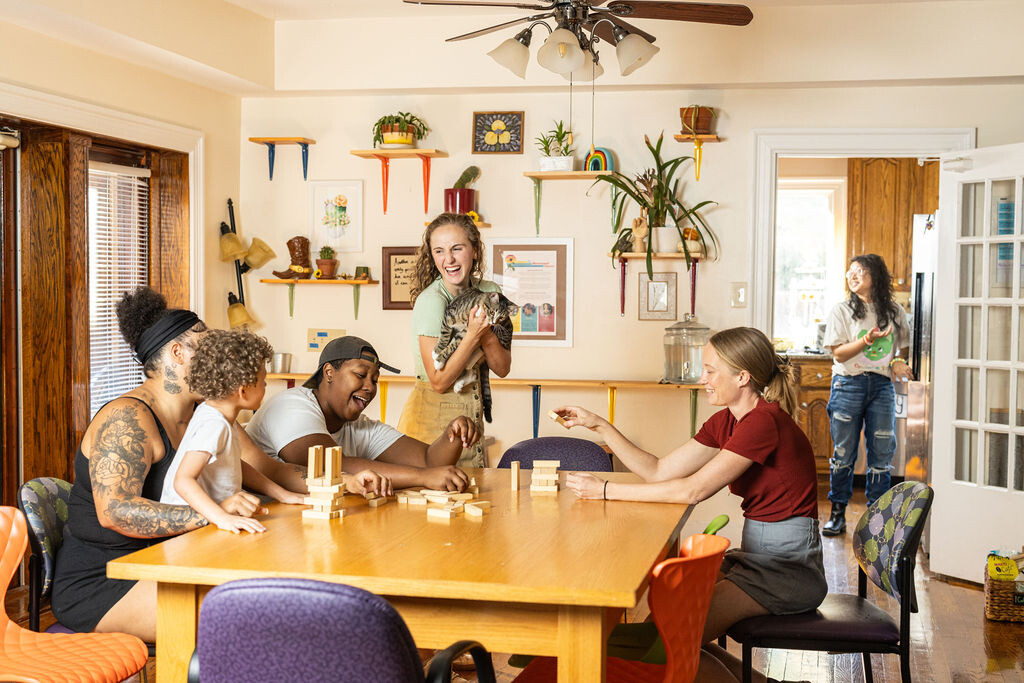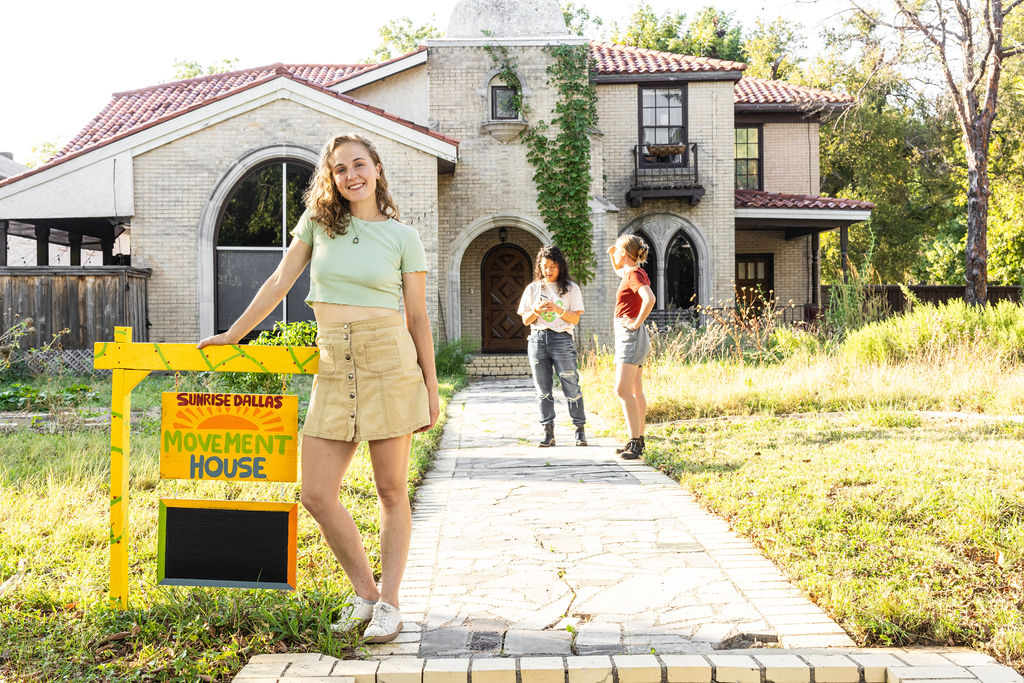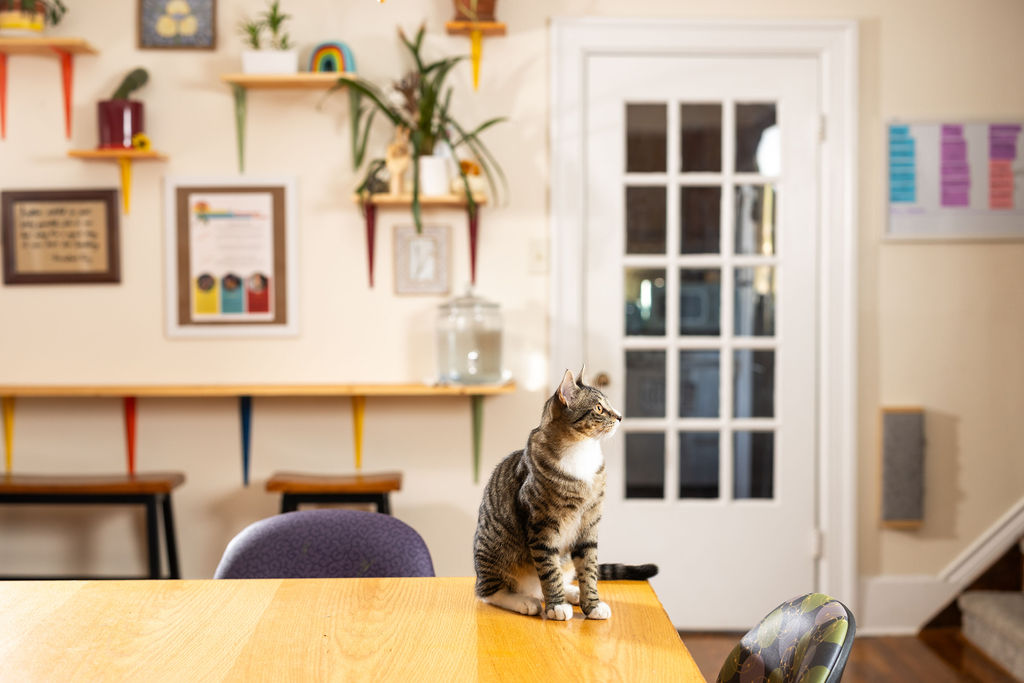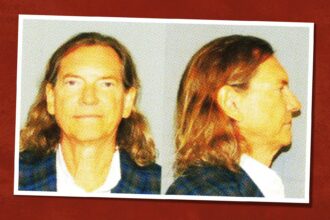Like many twenty-somethings, Hope Endrenyi had been browsing listings—first, homes for sale and then more practical rentals—for weeks before she found the perfect place. It was decently priced and spacious, and perhaps most importantly, the landlord didn’t mind a few DIY projects.
Endrenyi is a performing artist who worked on Broadway but moved back to Dallas during the pandemic. She wasn’t just looking for a place to call her own. As a founding member of the Dallas Sunrise Movement, this was the first step in creating the Movement House: a hub for the climate action group’s activism and outreach campaigns, which would also provide affordable rent for young people in social justice organizing circles.
“For a long time, our hub didn’t really have a physical location to meet and work out of,” Endrenyi says. “We kind of hopped from place to place, like Half Price Books that had free Wi-Fi and tables.”
But the movement quickly outgrew that space. It relied on churches and offices to donate their space for a couple of hours. “And then the pandemic happened and we all went virtual,” she says. As social distancing requirements lifted and life eased back to normal, the need for a central meeting place to call their own became apparent.
The inspiration for the Movement House came after a 400 mile trip between Houston and New Orleans, dubbed the Gulf South March, in 2021. Sunrise activists from all over Texas and Louisiana made stops in various hurricane-prone communities that have already experienced the devastating effects of climate change. Community members in Louisiana’s Cancer Alley or Houston’s Ship Channel had stepped up to fight the petrochemical industry’s footprint, and they would often offer their own homes as gathering spaces for meetings that kept neighbors connected and involved.
“What we saw in these different spaces is that they were rooted in community, and homes or community centers tend to serve a dual purpose to foster these relationships,” Endrenyi says. “That kind of close proximity really highlighted the importance of community for any successful organizing campaign to take place.”
Sunrise Dallas has been in the home for two years now. It’s been a base for their recently completed campaign to secure free DART access for public school students in the county. Recently, group members sprawled out onto the array of comfortable couches for a group retreat. They strategized and set goals for their next campaign, with some members on Zoom cast onto a nearby TV.
The group has also hosted events like zero-waste clothing swaps and meet-and-greets over coffee and donuts. They’ve held tailgates for Cowboys games with the neighbors. Endrenyi has a vision for the house as a larger educational space for neighbors and passersby who are curious about the garden and colorful signage about the Green New Deal and climate change.
That concept has long been a feature of social justice organizing. In Dallas, civil rights leader Juanita Craft’s home became a gathering spot for Black teenagers and young people in the 60s and 70s, who could absorb social justice lessons from Craft in her own living room. The broader national Sunrise Movement also has movement houses in other hubs, which helped launch the movement nearly a decade ago. The Philadelphia chapter’s space was featured on the fifth season of the Netflix makeover show Queer Eye.
Four members live in the house. Not all of them are Sunrise members, but all have a shared set of values around social and environmental justice. “I love what they do here, But I’m not officially a Sunrise member,” says Stephanie Ceniza, one of three housemates currently living in the Movement House.
“A couple years ago, Sunrise activists did a hunger strike, and it really hit the news, and I saw it on Instagram and Tik Tok,” she says. “That level of direct action put them on my radar.”
As a housemate, she’s been drawn more into Sunrise’s activism, and the experiment of communal living has also provided an opportunity to put into practice idealistic ideas about more socially-conscious styles of living, she says.
“It’s like I’m being presented with an opportunity to learn more through osmosis,” she says. “My personal politics haven’t changed, but if anything it’s deepened because of the urgency around climate change.”
The house itself is an unusual piece of architecture on Gaston Avenue in East Dallas. In past lives, it was used as a church and a dental clinic. Arched windows and church pews give visitors a peek into the home’s former identity. Today, the tidy four-bedroom house is filled with thrifted and donated furniture, bright posters and art on the walls, and indoor plants that give off the vibe of a post-college apartment. Labeled bins for compost, recycling, and trash are neatly lined up in the kitchen, and bulletin boards advertise upcoming events above a community library shelf filled with books on environmentalism and climate change. A house cat named Shishito roams around freely, seeking the occasional cuddle.
Outside, Endrenyi and Sunrise volunteers planted a native garden on one side of the front lawn, and vegetable and herb beds on the other side. They laid gravel and stone to create a meandering path for visitors to walk through and admire the flora. On a side patio, the Dallas Bicycle Coalition stores extra bikes, and community members can borrow them to explore the neighborhood or take the Santa Fe Trail all the way to White Rock Lake. A larger outdoor space in the back serves as another gathering and meeting spot, weather permitting.
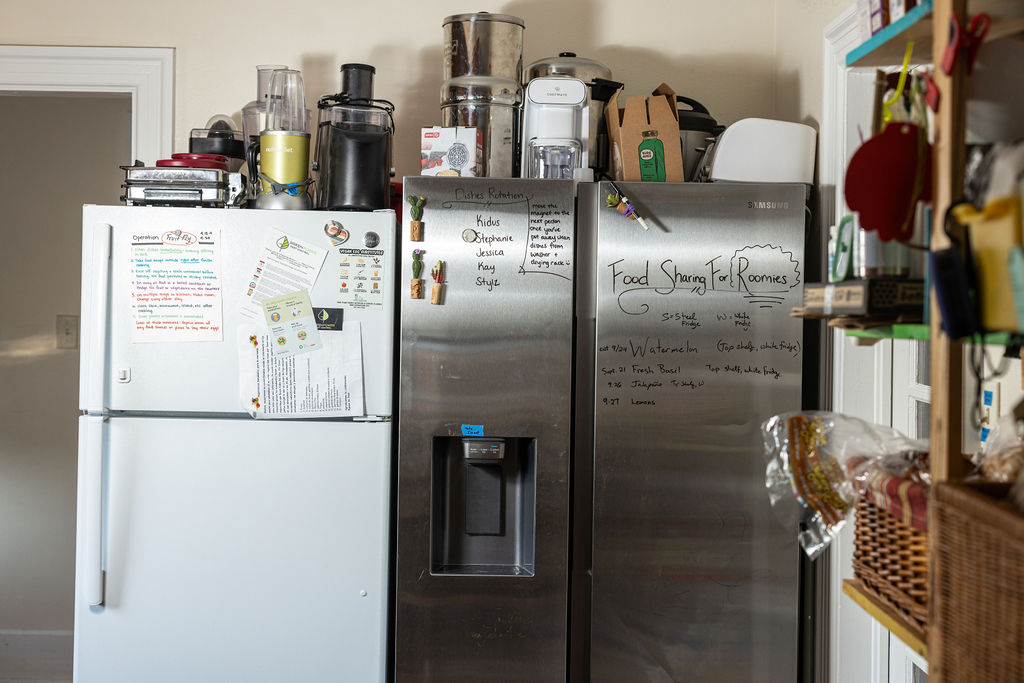
Sunrise also lets other community groups—like the Dallas Social Queer Org, mutual aid groups, and the local Democratic Socialists chapter—book the space for their own events. “We really didn’t want this space to just be for Sunrise,” Endrenyi says. “We wanted it to be a resource for the community, and for other incredible groups who need free venue space.”
Roommate agreements, quiet hours, and chore charts help keep the peace while the home serves a dual function, Ceniza says. “We are very intentional about our house meetings, with a level of empathy, transparency and communication that I’ve never had before,” she says.
In an age where many Americans report feeling more isolated than ever, cooperative living also offers a sense of community and shared values and resources that many people struggle to find in other social circles.
“I was living alone through the pandemic,” Ceniza says. “I wanted something to change, so I got more involved with mutual aid but I also wanted something different in my housing. To have company that’s friendly and safe– it’s definitely made a difference. It’s made me less lonely.”


